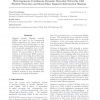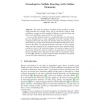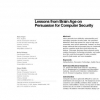560 search results - page 26 / 112 » From Continuous to Discrete Games |
ICML
2010
IEEE
13 years 6 months ago
2010
IEEE
Classical dynamic Bayesian networks (DBNs) are based on the homogeneous Markov assumption and cannot deal with heterogeneity and non-stationarity in temporal processes. Various ap...
ATAL
2011
Springer
12 years 7 months ago
2011
Springer
We develop an algorithm for opponent modeling in large extensive-form games of imperfect information. It works by observing the opponent’s action frequencies and building an opp...
CAAN
2007
Springer
13 years 11 months ago
2007
Springer
We study the efficiency of selfish routing problems in which traffic demands are revealed online. We go beyond the common Nash equilibrium concept in which possibly all players rer...
JMLR
2010
13 years 2 months ago
2010
In this paper we integrate two essential processes, discretization of continuous data and learning of a model that explains them, towards fully computational machine learning from...
CHI
2009
ACM
14 years 8 months ago
2009
ACM
Users generally have difficulty understanding and managing computer security tasks. We examined Nintendo's Brain Age games for ways to help users remember more secure passwor...



